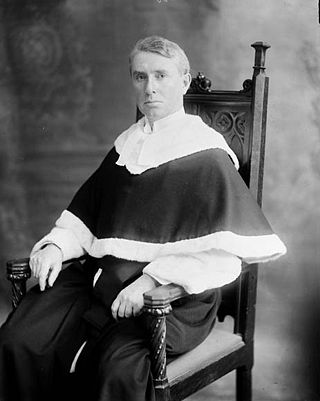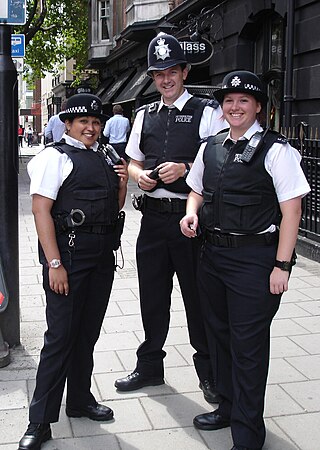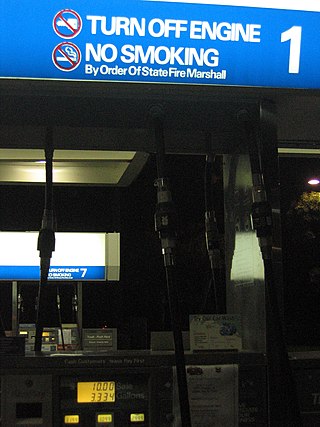
The term magistrate is used in a variety of systems of governments and laws to refer to a civilian officer who administers the law. In ancient Rome, a magistratus was one of the highest ranking government officers, and possessed both judicial and executive powers. In other parts of the world, such as China, a magistrate was responsible for administration over a particular geographic area. Today, in some jurisdictions, a magistrate is a judicial officer who hears cases in a lower court, and typically deals with more minor or preliminary matters. In other jurisdictions, magistrates are typically trained volunteers appointed to deal with criminal and civil matters in their local areas.

Law enforcement in the United Kingdom is organised separately in each of the legal systems of the United Kingdom: England and Wales, Scotland, and Northern Ireland. Most law enforcement duties are carried out by those who hold the office of police constable of a territorial police force.

A fire marshal, in the United States and Canada, is often a member of a state, provincial or territorial government, but may be part of a building department or a separate department altogether. Fire marshals' duties vary but usually include fire code enforcement or investigating fires for origin and cause. Fire marshals may be sworn law-enforcement officers and are often experienced firefighters. In larger cities with substantially developed fire departments the local fire departments are sometimes delegated some of the duties of the fire marshal.
A Police Community Support Officer, or as written in legislation Community Support Officer, is a uniformed member of police staff in England and Wales, a role created by Section 38(2) of the Police Reform Act 2002, which was given Royal Assent by Queen Elizabeth II on 24 July 2002. They are non-warranted but provided with a variety of police powers and the power of a constable in various instances by the forty-three territorial police forces in England and Wales and the British Transport Police.

A parking enforcement officer (PEO), traffic warden, parking inspector/parking officer, or civil enforcement officer is a member of a traffic control agency, local government, or police force who issues tickets for parking violations. The term parking attendant is sometimes considered a synonym but sometimes used to refer to the different profession of parking lot attendant.

Law enforcement in Australia is one of the three major components of the country's justice system, along with courts and corrections. Law enforcement officers are employed by all three levels of government – federal, state/territory, and local.
A churchwarden is a lay official in a parish or congregation of the Anglican Communion or Catholic Church, usually working as a part-time volunteer. In the Anglican tradition, holders of these positions are ex officio members of the parish board, usually called a vestry, parochial church council, or in the case of a Cathedral parish the chapter.
A law enforcement officer (LEO), or peace officer in North American English, is a public-sector or private-sector employee whose duties primarily involve the enforcement of laws, protecting life & property, keeping the peace, and other public safety related duties. Law enforcement officers are designated certain powers & authority by law to allow them to carry out their responsibilities.

In England and Wales, a magistrates' court is a lower court which hears matters relating to summary offences and some triable either-way matters. Some civil law issues are also decided here, notably family proceedings. In 2010, there were 320 magistrates' courts in England and Wales; by 2020, a decade later, 164 of those had closed. The jurisdiction of magistrates' courts and rules governing them are set out in the Magistrates' Courts Act 1980.

As of 2020, more than 800,000 sworn law enforcement officers have been serving in the United States. About 137,000 of those officers work for federal law enforcement agencies.

Law enforcement in Finland is the responsibility of several agencies. The Police of Finland, a national police agency, is responsible for most tasks. The two other main agencies are the Finnish Border/Coast Guards and the Finnish Customs. Examples of other agencies with limited policing powers are the Finnish Defence Forces, municipal parking inspectors and railway staff.

A bylaw enforcement officer is an employee of a municipality, county or regional district, charged with the enforcement of local ordinance—bylaws, laws, codes, or regulations enacted by local governments. Bylaw enforcement officers often work closely with police and other law enforcement agencies, but are generally not considered emergency services.

Community safety accreditation schemes enable the chief constable of a police force in the United Kingdom to grant a limited range of police powers to employees of non-police organisations bolstering community safety. Community safety accreditation schemes were created under section 40 of the Police Reform Act 2002. Individuals who have been granted these powers are known under the Act as accredited persons.

A security guard is a person employed by a government or private party to protect the employing party's assets from a variety of hazards by enforcing preventative measures. Security guards do this by maintaining a high-visibility presence to deter illegal and inappropriate actions, looking for signs of crime or other hazards, taking action to minimize damage, and reporting any incidents to their clients and emergency services, as appropriate.
A civil enforcement officer is a person employed to enforce parking, traffic and other restrictions and laws.

National Police Corps, colloquially in English as Dutch National Police or National Police Force, is divided in ten regional units, a central unit, the police academy, police services center, and national dispatch center cooperation. The law-enforcement purposes of these agencies are the investigation of suspected criminal activity, referral of the results of investigations to the courts, and the temporary detention of suspected criminals pending judicial action. Law enforcement agencies, to varying degrees at different levels of government and in different agencies, are also commonly charged with the responsibilities of deterring criminal activity and preventing the successful commission of crimes in progress. The police commissioner in the Netherlands is Henk van Essen since May 1, 2020.
The powers of the police in England and Wales are defined largely by statute law, with the main sources of power being the Police and Criminal Evidence Act 1984 and the Police Act 1996. This article covers the powers of police officers of territorial police forces only, but a police officer in one of the UK's special police forces can utilise extended jurisdiction powers outside of their normal jurisdiction in certain defined situations as set out in statute. In law, police powers are given to constables. All police officers in England and Wales are "constables" in law whatever their rank. Certain police powers are also available to a limited extent to police community support officers and other non warranted positions such as police civilian investigators or designated detention officers employed by some police forces even though they are not constables.
Following the common law system introduced into Hong Kong when it became a Crown colony, Hong Kong's criminal procedural law and the underlying principles are very similar to the one in the UK. Like other common law jurisdictions, Hong Kong follows the principle of presumption of innocence. This principle penetrates the whole system of Hong Kong's criminal procedure and criminal law. Viscount Sankey once described this principle as a 'golden thread'. Therefore, knowing this principle is vital for understanding the criminal procedures practised in Hong Kong.

The Anti-Social Behaviour, Crime and Policing Act 2014 is an Act of the Parliament of the United Kingdom which consolidated and expanded law enforcement powers in addressing anti-social behaviour. One significant aspect of the act is that it replaced anti-social behaviour orders, the primary civil order in the United Kingdom since 1998, with criminal behaviour orders.












